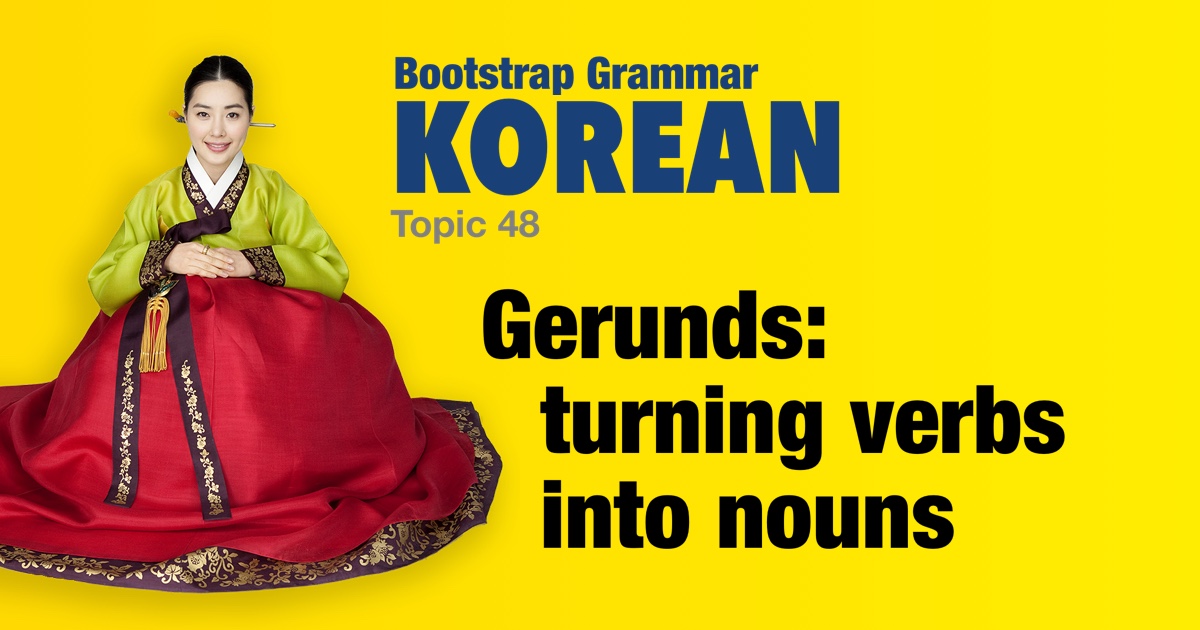Korean grammar - Gerunds: turning verbs into nouns |
|||
|
|||
Pattern: Verb stem + 는/(으)ㄴ/(으)ㄹ 것 A gerund is a verb like 'to do' that is turned into a noun ⇒ 'doing' or 'the thing that was/is being/will be done'. In Korean the gerund must agree in tense. • Present tense: Verb stem + 는 것 • Past tense: Verb stem + (으)ㄴ 것 -- If the Verb stem ends in ㄹ it is common to drop the ㄹ before appending (으)ㄴor 는. • Future tense: Verb stem + (으)ㄹ 것 Note that very often 것 is abbreviated to 거. |
| Examples: | |
|
수영하는 것이 재미있어요.
Swimming is fun.
|
|
|
수영하는 것은 취미예요.
Swimming is (my) hobby.
|
|
|
수영하는 것을 좋아해요.
(I) like swimming.
|
|
|
늦게 먹는 것은 건강에 나빠요.
Eating late is bad for (your) heath.
|
|
|
수업 시간에 음악 듣는 것을 금지해요.
During class time listening to music is prohibited.
|
|
|
내 남자 친구는 기타 치는 것을 좋아해요.
My boyfriend likes playing guitar.
|
|
|
아침 일찍 일어나는 것은 힘들어요.
Getting up early in the morning is hard.
|
|
|
오늘 아침 일찍 일어난 것은 힘들었어요.
Getting up early this morning was hard.
|
|
|
친구들이랑 노는 것을 좋아해요.
I like hanging out with my friends.
|
|
|
아이들하고 노는 것이 재미있어요.
Playing with kids is fun.
|
|
|
다시 하는 것 어때요?
How about doing it again?
|
|
|
안으로 들어가는 거 어때요?
How about going inside?
|
|
|
이렇게 하는 건 어때요?
How about doing it this way (then)?
|
|
|
내일 집에서 쉬는 게 어때요?
How about resting at home tomorrow?
|
|
|
아이들하고 논 것은 재미있었어요.
Playing with kids was fun.
|
|
|
음식 만드는 것은 재미없어요.
Making food is not fun.
|
|
|
약을 먹는 것이 싫어요.
I don’t like taking medicine.
|
|
|
동생이 숙제하는 것을 도와줄 거예요.
I will help my younger sibling to do homework.
|
|
|
지난주에 공부한 것을 잊어버렸어요.
I forgot the thing that I studied last week.
|
|
|
아까 종이에 쓴 것이 이름이에요?
Was the thing that you wrote on the paper a moment ago a name?
|
|
|
내일 공부할 것이 뭐예요?
What is the thing that (we) will study tomorrow?
|
|
|
한국에 안 갈 것이지만 여전히 한국어를 배우고 싶어요.
Even though (I) will not go to Korea, I still want to learn Korean.
|
|
|
파리를 볼 것을 기대해요.
(I) look forward to seeing Paris.
|
|
|
어제 다 사서 오늘은 살 것이 없어요.
(I) bought everything yesterday, so I have nothing to buy today.
|
|
 |
|




